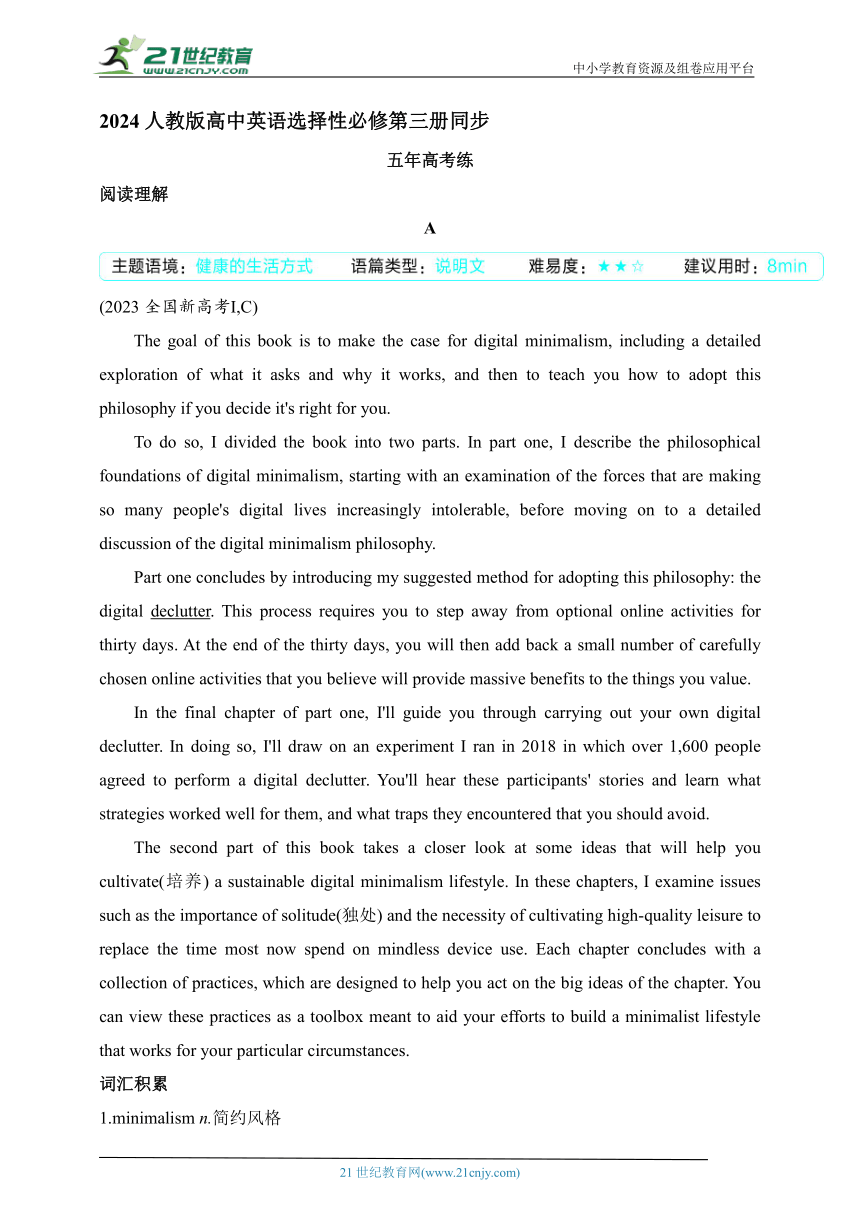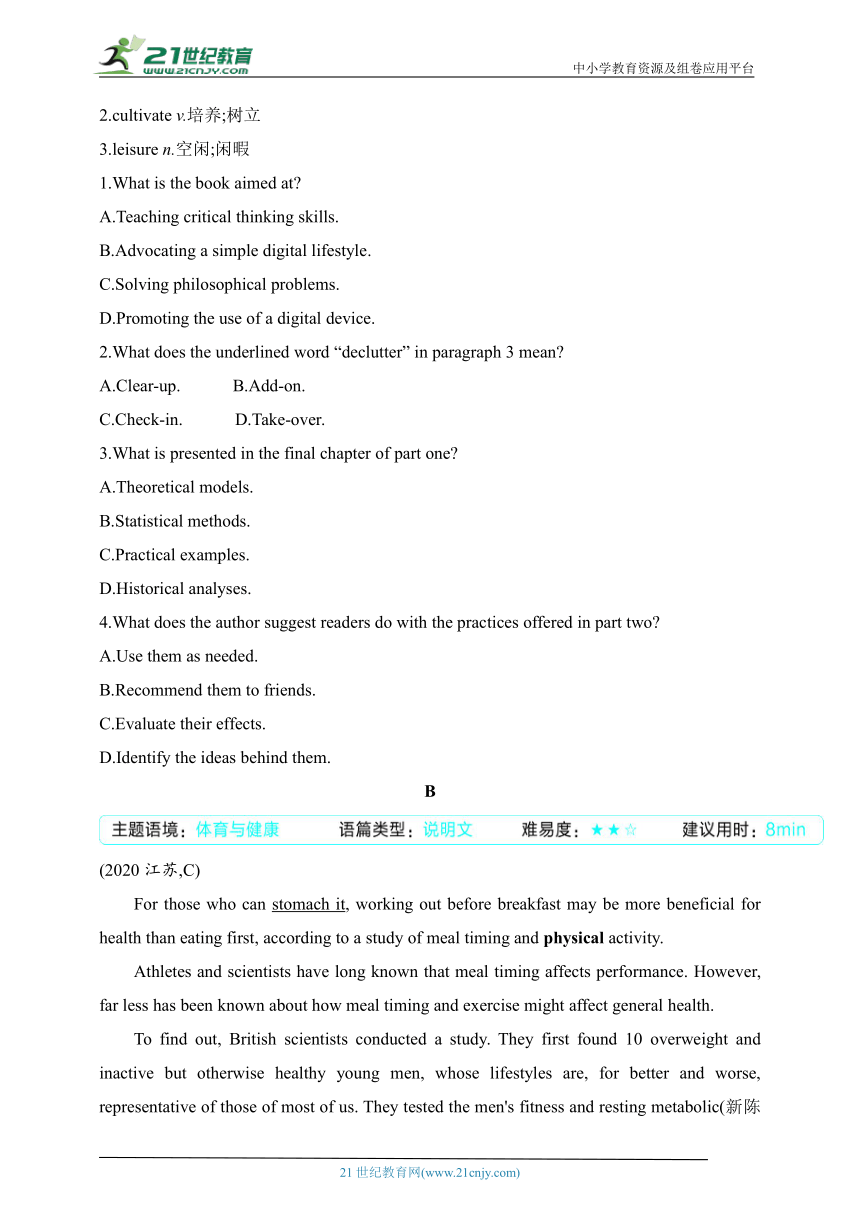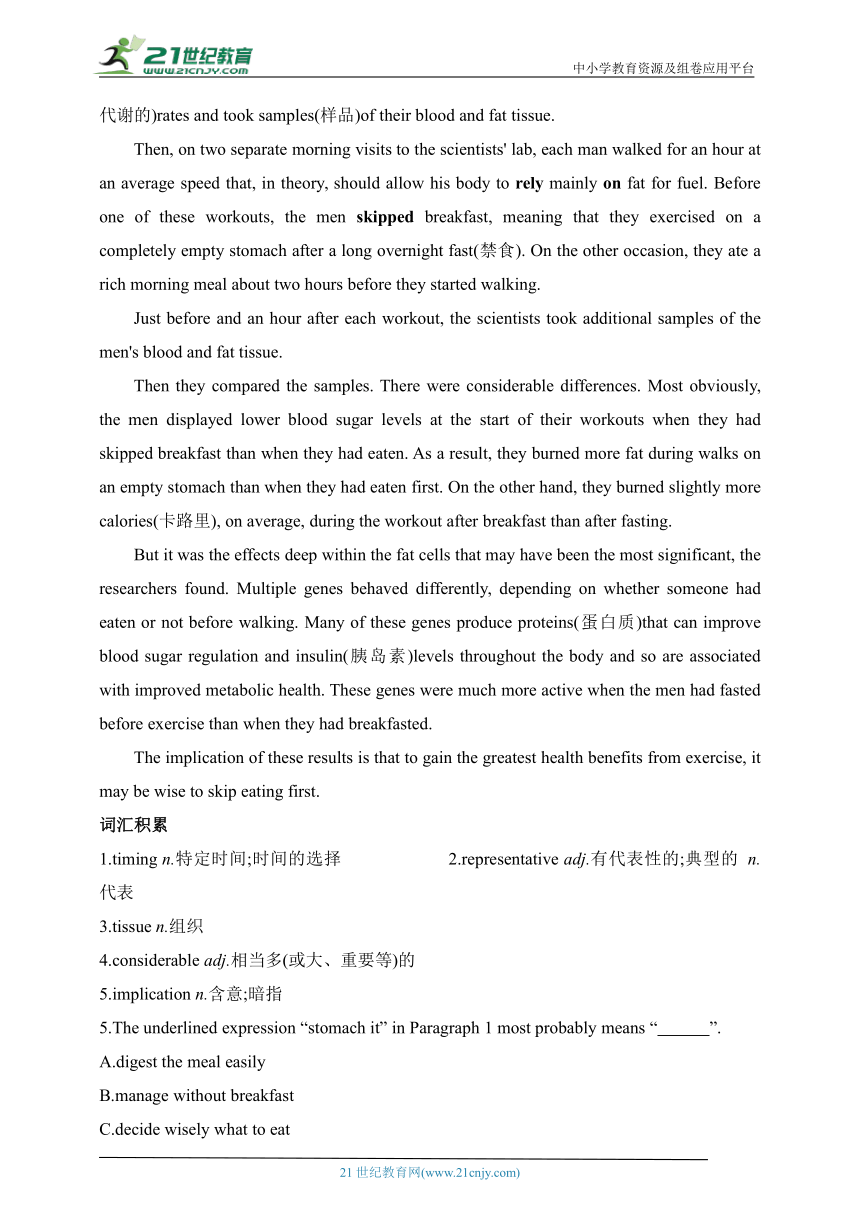2024人教版高中英语选择性必修第三册同步练习题--UNIT 2 高考练(答案与解析)
文档属性
| 名称 | 2024人教版高中英语选择性必修第三册同步练习题--UNIT 2 高考练(答案与解析) |  | |
| 格式 | docx | ||
| 文件大小 | 1020.1KB | ||
| 资源类型 | 试卷 | ||
| 版本资源 | 人教版(2019) | ||
| 科目 | 英语 | ||
| 更新时间 | 2023-10-18 09:46:13 | ||
图片预览



文档简介
中小学教育资源及组卷应用平台
2024人教版高中英语选择性必修第三册同步
五年高考练
阅读理解
A
(2023全国新高考Ⅰ,C)
The goal of this book is to make the case for digital minimalism, including a detailed exploration of what it asks and why it works, and then to teach you how to adopt this philosophy if you decide it's right for you.
To do so, I divided the book into two parts. In part one, I describe the philosophical foundations of digital minimalism, starting with an examination of the forces that are making so many people's digital lives increasingly intolerable, before moving on to a detailed discussion of the digital minimalism philosophy.
Part one concludes by introducing my suggested method for adopting this philosophy: the digital declutter. This process requires you to step away from optional online activities for thirty days. At the end of the thirty days, you will then add back a small number of carefully chosen online activities that you believe will provide massive benefits to the things you value.
In the final chapter of part one, I'll guide you through carrying out your own digital declutter. In doing so, I'll draw on an experiment I ran in 2018 in which over 1,600 people agreed to perform a digital declutter. You'll hear these participants' stories and learn what strategies worked well for them, and what traps they encountered that you should avoid.
The second part of this book takes a closer look at some ideas that will help you cultivate(培养) a sustainable digital minimalism lifestyle. In these chapters, I examine issues such as the importance of solitude(独处) and the necessity of cultivating high-quality leisure to replace the time most now spend on mindless device use. Each chapter concludes with a collection of practices, which are designed to help you act on the big ideas of the chapter. You can view these practices as a toolbox meant to aid your efforts to build a minimalist lifestyle that works for your particular circumstances.
词汇积累
1.minimalism n.简约风格
2.cultivate v.培养;树立
3.leisure n.空闲;闲暇
1.What is the book aimed at
A.Teaching critical thinking skills.
B.Advocating a simple digital lifestyle.
C.Solving philosophical problems.
D.Promoting the use of a digital device.
2.What does the underlined word “declutter” in paragraph 3 mean
A.Clear-up. B.Add-on.
C.Check-in. D.Take-over.
3.What is presented in the final chapter of part one
A.Theoretical models.
B.Statistical methods.
C.Practical examples.
D.Historical analyses.
4.What does the author suggest readers do with the practices offered in part two
A.Use them as needed.
B.Recommend them to friends.
C.Evaluate their effects.
D.Identify the ideas behind them.
B
(2020江苏,C)
For those who can stomach it, working out before breakfast may be more beneficial for health than eating first, according to a study of meal timing and physical activity.
Athletes and scientists have long known that meal timing affects performance. However, far less has been known about how meal timing and exercise might affect general health.
To find out, British scientists conducted a study. They first found 10 overweight and inactive but otherwise healthy young men, whose lifestyles are, for better and worse, representative of those of most of us. They tested the men's fitness and resting metabolic(新陈代谢的)rates and took samples(样品)of their blood and fat tissue.
Then, on two separate morning visits to the scientists' lab, each man walked for an hour at an average speed that, in theory, should allow his body to rely mainly on fat for fuel. Before one of these workouts, the men skipped breakfast, meaning that they exercised on a completely empty stomach after a long overnight fast(禁食). On the other occasion, they ate a rich morning meal about two hours before they started walking.
Just before and an hour after each workout, the scientists took additional samples of the men's blood and fat tissue.
Then they compared the samples. There were considerable differences. Most obviously, the men displayed lower blood sugar levels at the start of their workouts when they had skipped breakfast than when they had eaten. As a result, they burned more fat during walks on an empty stomach than when they had eaten first. On the other hand, they burned slightly more calories(卡路里), on average, during the workout after breakfast than after fasting.
But it was the effects deep within the fat cells that may have been the most significant, the researchers found. Multiple genes behaved differently, depending on whether someone had eaten or not before walking. Many of these genes produce proteins(蛋白质)that can improve blood sugar regulation and insulin(胰岛素)levels throughout the body and so are associated with improved metabolic health. These genes were much more active when the men had fasted before exercise than when they had breakfasted.
The implication of these results is that to gain the greatest health benefits from exercise, it may be wise to skip eating first.
词汇积累
1.timing n.特定时间;时间的选择 2.representative adj.有代表性的;典型的 n.代表
3.tissue n.组织
4.considerable adj.相当多(或大、重要等)的
5.implication n.含意;暗指
5.The underlined expression “stomach it” in Paragraph 1 most probably means “ ”.
A.digest the meal easily
B.manage without breakfast
C.decide wisely what to eat
D.eat whatever is offered
6.Why were the 10 people chosen for the experiment
A.Their lifestyles were typical of ordinary people.
B.Their lack of exercise led to overweight.
C.They could walk at an average speed.
D.They had slow metabolic rates.
7.What happened to those who ate breakfast before exercise
A.They successfully lost weight.
B.They consumed a bit more calories.
C.They burned more fat on average.
D.They displayed higher insulin levels.
8.What could be learned from the research
A.A workout after breakfast improves gene performances.
B.Too much workout often slows metabolic rates.
C.Lifestyle is not as important as morning exercise.
D.Physical exercise before breakfast is better for health.
答案与分层梯度式解析
UNIT 2 HEALTHY LIFESTYLE
五年高考练
A
◎语篇解读 本文是说明文,主要介绍了一本书,其中包括这本书的组成部分以及各部分的内容。读这本书可以帮读者践行数字极简主义的生活方式。
1.B 细节理解题。根据题干关键词aimed at可定位到第一段中的goal。根据第一段内容可知,这本书的目的是解释数字极简主义(make the case for digital minimalism),包括详细探索它的要求是什么和它为什么有效,并且教你如何采用这种生活方式。其中teach you how to adopt和digital minimalism分别与B项中的Advocating和simple digital lifestyle相呼应。故选B(倡导一种简单的数字生活方式)。A项意为“教授批判性思维技巧”,C项意为“解决哲学问题”,D项意为“推广数码设备的使用”。
2.A 词义猜测题。根据画线词所在句中的冒号可知,the digital declutter就是“my suggested method for adopting this philosophy”。this philosophy指的是数字极简主义(digital minimalism),那么采用这种生活方式的方法也应该与极简有关。后句是对the digital declutter的具体阐述——30天不参加非强制的线上活动,30天结束的时候,选择参加少量真正对你有好处的线上活动。言外之意就是,对数字活动进行清理(Clear-up)。故选A。
3.C 细节理解题。根据题干关键词the final chapter of part one可定位到第四段。在第一部分的最后一个章节,作者会分享1,600多名参与者的故事以及具体的策略,同时也会提醒大家可能遇到的陷阱。这些都是真实的事例(Practical examples)。故选C。A项意为“理论模型”,B项意为“统计方法”,D项意为“历史分析”。
4.A 细节理解题。本题问的是“对于第二部分提供的具体做法,作者建议读者怎么做 ”。根据题干关键词the practices offered in part two可定位到最后一段最后两句。核心的内容是“view these practices as a toolbox meant to aid your efforts to build a minimalist lifestyle”,即把这些具体做法当成一个工具箱。故选A。
长难句
原句 The goal of this book is to make the case for digital minimalism,including a detailed exploration of what it asks and why it works, and then to teach you how to adopt this philosophy if you decide it's right for you.
分析 and连接两个并列的表语,在第一个表语中,what it asks和why it works是介词of后两个并列的宾语从句;在第二个表语中,how to adopt this philosophy if you decide it's right for you是“疑问词+不定式”结构作teach的宾语,其中包含if引导的条件状语从句。
译文 本书的目标是解释数字极简主义,包括详细探索它的要求是什么和它为什么有效,如果你断定它适合你的话,本书会教你如何采用这种生活方式。
B
◎语篇解读 本文是一篇说明文。文章讲述了进食时间、锻炼和健康这三者之间的关系。
5.B 词义猜测题。由第一段第一句“对于那些 的人而言,早饭前锻炼可能要比吃了早饭锻炼对健康更有好处”和四个选项A:容易消化食物;B:不吃早饭也能应付;C:明智地决定吃什么;D:有什么吃什么可知,B项符合语境。
6.A 细节理解题。根据第三段的“whose lifestyles are,...representative of those of most of us”可知,无论好坏,这十个人的生活方式代表着我们大多数人的生活方式。故A项“他们的生活方式在普通人中很典型”正确。
7.B 细节理解题。根据第六段中的“On the other hand, they burned slightly more calories...”可知,吃了早饭锻炼的人燃烧了稍微多一点的卡路里。故答案为B项“他们消耗了更多一点的卡路里”。
8.D 主旨大意题。从文中最后一段中的“to gain the greatest health benefits...it may be wise to skip eating first”可知,为了从锻炼中获得最大的健康好处,不进食锻炼是明智的。故选D项“早饭前(进行)体育锻炼对身体健康会更好”。
长难句
原句 The implication of these results is that to gain the greatest health benefits from exercise, it may be wise to skip eating first.
分析 本句是一个主从复合句,that引导表语从句。从句中的主语是形式主语it,真正的主语是动词不定式短语“to skip eating first”, “to gain the greatest health benefits from exercise”是动词不定式短语作目的状语。
译文 这些结果表明,为了从锻炼中获得最大的健康好处,先不吃饭可能是明智的。
21世纪教育网 www.21cnjy.com 精品试卷·第 2 页 (共 2 页)
21世纪教育网(www.21cnjy.com)
2024人教版高中英语选择性必修第三册同步
五年高考练
阅读理解
A
(2023全国新高考Ⅰ,C)
The goal of this book is to make the case for digital minimalism, including a detailed exploration of what it asks and why it works, and then to teach you how to adopt this philosophy if you decide it's right for you.
To do so, I divided the book into two parts. In part one, I describe the philosophical foundations of digital minimalism, starting with an examination of the forces that are making so many people's digital lives increasingly intolerable, before moving on to a detailed discussion of the digital minimalism philosophy.
Part one concludes by introducing my suggested method for adopting this philosophy: the digital declutter. This process requires you to step away from optional online activities for thirty days. At the end of the thirty days, you will then add back a small number of carefully chosen online activities that you believe will provide massive benefits to the things you value.
In the final chapter of part one, I'll guide you through carrying out your own digital declutter. In doing so, I'll draw on an experiment I ran in 2018 in which over 1,600 people agreed to perform a digital declutter. You'll hear these participants' stories and learn what strategies worked well for them, and what traps they encountered that you should avoid.
The second part of this book takes a closer look at some ideas that will help you cultivate(培养) a sustainable digital minimalism lifestyle. In these chapters, I examine issues such as the importance of solitude(独处) and the necessity of cultivating high-quality leisure to replace the time most now spend on mindless device use. Each chapter concludes with a collection of practices, which are designed to help you act on the big ideas of the chapter. You can view these practices as a toolbox meant to aid your efforts to build a minimalist lifestyle that works for your particular circumstances.
词汇积累
1.minimalism n.简约风格
2.cultivate v.培养;树立
3.leisure n.空闲;闲暇
1.What is the book aimed at
A.Teaching critical thinking skills.
B.Advocating a simple digital lifestyle.
C.Solving philosophical problems.
D.Promoting the use of a digital device.
2.What does the underlined word “declutter” in paragraph 3 mean
A.Clear-up. B.Add-on.
C.Check-in. D.Take-over.
3.What is presented in the final chapter of part one
A.Theoretical models.
B.Statistical methods.
C.Practical examples.
D.Historical analyses.
4.What does the author suggest readers do with the practices offered in part two
A.Use them as needed.
B.Recommend them to friends.
C.Evaluate their effects.
D.Identify the ideas behind them.
B
(2020江苏,C)
For those who can stomach it, working out before breakfast may be more beneficial for health than eating first, according to a study of meal timing and physical activity.
Athletes and scientists have long known that meal timing affects performance. However, far less has been known about how meal timing and exercise might affect general health.
To find out, British scientists conducted a study. They first found 10 overweight and inactive but otherwise healthy young men, whose lifestyles are, for better and worse, representative of those of most of us. They tested the men's fitness and resting metabolic(新陈代谢的)rates and took samples(样品)of their blood and fat tissue.
Then, on two separate morning visits to the scientists' lab, each man walked for an hour at an average speed that, in theory, should allow his body to rely mainly on fat for fuel. Before one of these workouts, the men skipped breakfast, meaning that they exercised on a completely empty stomach after a long overnight fast(禁食). On the other occasion, they ate a rich morning meal about two hours before they started walking.
Just before and an hour after each workout, the scientists took additional samples of the men's blood and fat tissue.
Then they compared the samples. There were considerable differences. Most obviously, the men displayed lower blood sugar levels at the start of their workouts when they had skipped breakfast than when they had eaten. As a result, they burned more fat during walks on an empty stomach than when they had eaten first. On the other hand, they burned slightly more calories(卡路里), on average, during the workout after breakfast than after fasting.
But it was the effects deep within the fat cells that may have been the most significant, the researchers found. Multiple genes behaved differently, depending on whether someone had eaten or not before walking. Many of these genes produce proteins(蛋白质)that can improve blood sugar regulation and insulin(胰岛素)levels throughout the body and so are associated with improved metabolic health. These genes were much more active when the men had fasted before exercise than when they had breakfasted.
The implication of these results is that to gain the greatest health benefits from exercise, it may be wise to skip eating first.
词汇积累
1.timing n.特定时间;时间的选择 2.representative adj.有代表性的;典型的 n.代表
3.tissue n.组织
4.considerable adj.相当多(或大、重要等)的
5.implication n.含意;暗指
5.The underlined expression “stomach it” in Paragraph 1 most probably means “ ”.
A.digest the meal easily
B.manage without breakfast
C.decide wisely what to eat
D.eat whatever is offered
6.Why were the 10 people chosen for the experiment
A.Their lifestyles were typical of ordinary people.
B.Their lack of exercise led to overweight.
C.They could walk at an average speed.
D.They had slow metabolic rates.
7.What happened to those who ate breakfast before exercise
A.They successfully lost weight.
B.They consumed a bit more calories.
C.They burned more fat on average.
D.They displayed higher insulin levels.
8.What could be learned from the research
A.A workout after breakfast improves gene performances.
B.Too much workout often slows metabolic rates.
C.Lifestyle is not as important as morning exercise.
D.Physical exercise before breakfast is better for health.
答案与分层梯度式解析
UNIT 2 HEALTHY LIFESTYLE
五年高考练
A
◎语篇解读 本文是说明文,主要介绍了一本书,其中包括这本书的组成部分以及各部分的内容。读这本书可以帮读者践行数字极简主义的生活方式。
1.B 细节理解题。根据题干关键词aimed at可定位到第一段中的goal。根据第一段内容可知,这本书的目的是解释数字极简主义(make the case for digital minimalism),包括详细探索它的要求是什么和它为什么有效,并且教你如何采用这种生活方式。其中teach you how to adopt和digital minimalism分别与B项中的Advocating和simple digital lifestyle相呼应。故选B(倡导一种简单的数字生活方式)。A项意为“教授批判性思维技巧”,C项意为“解决哲学问题”,D项意为“推广数码设备的使用”。
2.A 词义猜测题。根据画线词所在句中的冒号可知,the digital declutter就是“my suggested method for adopting this philosophy”。this philosophy指的是数字极简主义(digital minimalism),那么采用这种生活方式的方法也应该与极简有关。后句是对the digital declutter的具体阐述——30天不参加非强制的线上活动,30天结束的时候,选择参加少量真正对你有好处的线上活动。言外之意就是,对数字活动进行清理(Clear-up)。故选A。
3.C 细节理解题。根据题干关键词the final chapter of part one可定位到第四段。在第一部分的最后一个章节,作者会分享1,600多名参与者的故事以及具体的策略,同时也会提醒大家可能遇到的陷阱。这些都是真实的事例(Practical examples)。故选C。A项意为“理论模型”,B项意为“统计方法”,D项意为“历史分析”。
4.A 细节理解题。本题问的是“对于第二部分提供的具体做法,作者建议读者怎么做 ”。根据题干关键词the practices offered in part two可定位到最后一段最后两句。核心的内容是“view these practices as a toolbox meant to aid your efforts to build a minimalist lifestyle”,即把这些具体做法当成一个工具箱。故选A。
长难句
原句 The goal of this book is to make the case for digital minimalism,including a detailed exploration of what it asks and why it works, and then to teach you how to adopt this philosophy if you decide it's right for you.
分析 and连接两个并列的表语,在第一个表语中,what it asks和why it works是介词of后两个并列的宾语从句;在第二个表语中,how to adopt this philosophy if you decide it's right for you是“疑问词+不定式”结构作teach的宾语,其中包含if引导的条件状语从句。
译文 本书的目标是解释数字极简主义,包括详细探索它的要求是什么和它为什么有效,如果你断定它适合你的话,本书会教你如何采用这种生活方式。
B
◎语篇解读 本文是一篇说明文。文章讲述了进食时间、锻炼和健康这三者之间的关系。
5.B 词义猜测题。由第一段第一句“对于那些 的人而言,早饭前锻炼可能要比吃了早饭锻炼对健康更有好处”和四个选项A:容易消化食物;B:不吃早饭也能应付;C:明智地决定吃什么;D:有什么吃什么可知,B项符合语境。
6.A 细节理解题。根据第三段的“whose lifestyles are,...representative of those of most of us”可知,无论好坏,这十个人的生活方式代表着我们大多数人的生活方式。故A项“他们的生活方式在普通人中很典型”正确。
7.B 细节理解题。根据第六段中的“On the other hand, they burned slightly more calories...”可知,吃了早饭锻炼的人燃烧了稍微多一点的卡路里。故答案为B项“他们消耗了更多一点的卡路里”。
8.D 主旨大意题。从文中最后一段中的“to gain the greatest health benefits...it may be wise to skip eating first”可知,为了从锻炼中获得最大的健康好处,不进食锻炼是明智的。故选D项“早饭前(进行)体育锻炼对身体健康会更好”。
长难句
原句 The implication of these results is that to gain the greatest health benefits from exercise, it may be wise to skip eating first.
分析 本句是一个主从复合句,that引导表语从句。从句中的主语是形式主语it,真正的主语是动词不定式短语“to skip eating first”, “to gain the greatest health benefits from exercise”是动词不定式短语作目的状语。
译文 这些结果表明,为了从锻炼中获得最大的健康好处,先不吃饭可能是明智的。
21世纪教育网 www.21cnjy.com 精品试卷·第 2 页 (共 2 页)
21世纪教育网(www.21cnjy.com)
